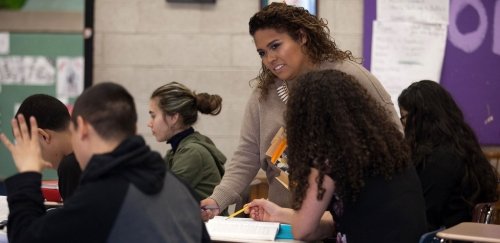Assessment for Learning Improvement

“We do not learn from experience…we learn from reflecting on experience.” – John Dewey
Assessment for Program Improvement
The FSEHD uses a continuous quality improvement (CQI) process to ensure candidates are ready to transition through the stages of their program, and that our program completers have the professional knowledge, skills, and dispositions necessary to work in educational settings with students and their families. The FSEHD CQI process guides the work of each department and program and is aligned with the FSEHD mission and learning outcomes. FSEHD programs also receive input from recent completers, alumni, and their school supervisors to identify areas for improvement.
Assessment for Student Growth
FSEHD students are assessed at multiple points and in multiple ways over the course of their program experience, from pre-admission using dispositional assessments through practicum and student teaching using observations.
The following tables provide an overview of FSEHD’s assessment points and instruments. Each assessment is linked to a description of the assessment and aggregated results of those assessments as available. Individual programs may have additional assessments at the course level to evaluate student proficiency in specific outcomes.
Undergraduate Teacher Preparation Assessment Points
| Assessment (RIDE Standards) | Program Entry: academic proficiencies | Preparing to teach: (RSTI) | Student Teaching: (RRL) | Program Completion | Post-Degree |
|---|---|---|---|---|---|
| SAT/ ACT/ CORE (Praxis I) | X | | | | |
| Credits earned | X | | | | |
| FSEHD course requirements (3) | X | | | | |
| GPA (1, 3) | X | X | X | X | |
| Program specific requirements and curriculum (1) | X | X | X | | |
| Dispositions | X | X | X | | |
| Community Service (2) | | X | | | |
| Field work, diversity (2) | | X | | | |
| Practicum (selected RI-ICEE elements) (1) | | X | | | |
| Teacher Candidate Mini Work Sample (TCMWS (1)) (or equivalent) | | X | | | |
| Praxis II (1) | | X | | | |
| Student survey of TC effectiveness | | X | X | | |
| TCWS (1) | | | X | | |
| Student teaching (RI-ICEE) (1) | | | X | | |
| TC site Evaluation (2) | | | | X | |
| CT Evaluation (2) | | | | X | |
| CS Evaluation (2) | | | | X | |
| TC program evaluation at exit (4) | | | | X | |
| RIDE Educator Effectiveness data (4) | | | | | X |
| Employer surveys (4) | | | | | X |
| Alumni surveys (4) | | | | | X |
| Recommended for licensure | X |
X= completed
Graduate Teacher Preparation Assessment Points
Pathway | Entry | Formative | Summative | Post-Graduate Feedback |
|---|---|---|---|---|
BA | X |
|
|
|
GPA > 3.00 | X |
|
|
|
Standardized test scores (GRE/MAT) | X |
|
|
|
Written communication rubric (professional goals essay) | X |
|
|
|
Performance based evaluation | X |
|
|
|
X | X | X |
| |
Practicum (including clinical hours consistent with certification requirements) |
| X |
|
|
| X | X |
| |
| X |
|
| |
|
| X |
| |
Internship (including clinical hours consistent with certification requirements) |
|
| X |
|
Professional Impact Project (or other impact on PK-12 student learning measure) |
|
| X |
|
|
|
| X | |
|
|
| X | |
Advancement in the profession |
|
|
| X |
X= completed

Contact Us
Feinstein School of Education and Human Development
The Feinstein School administers and coordinates all professional education programs at Rhode Island College. We offer a range of programs, including early childhood, pre-K-12, counseling, school psychology, youth development and health and wellness.
- emailfsehd@ric.edu
- phone401-456-8110
- placeHorace Mann Hall 241

